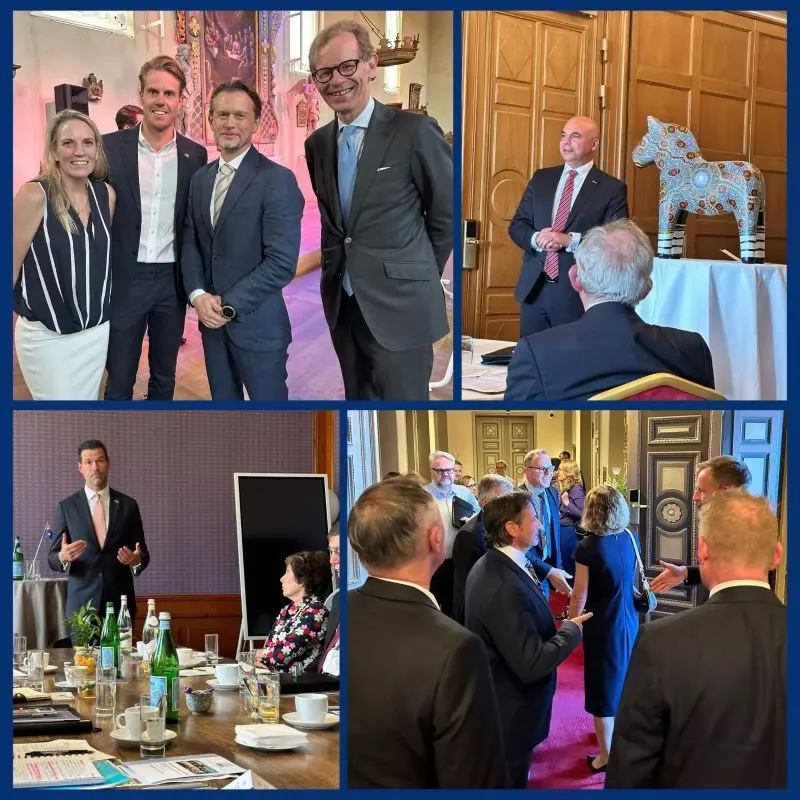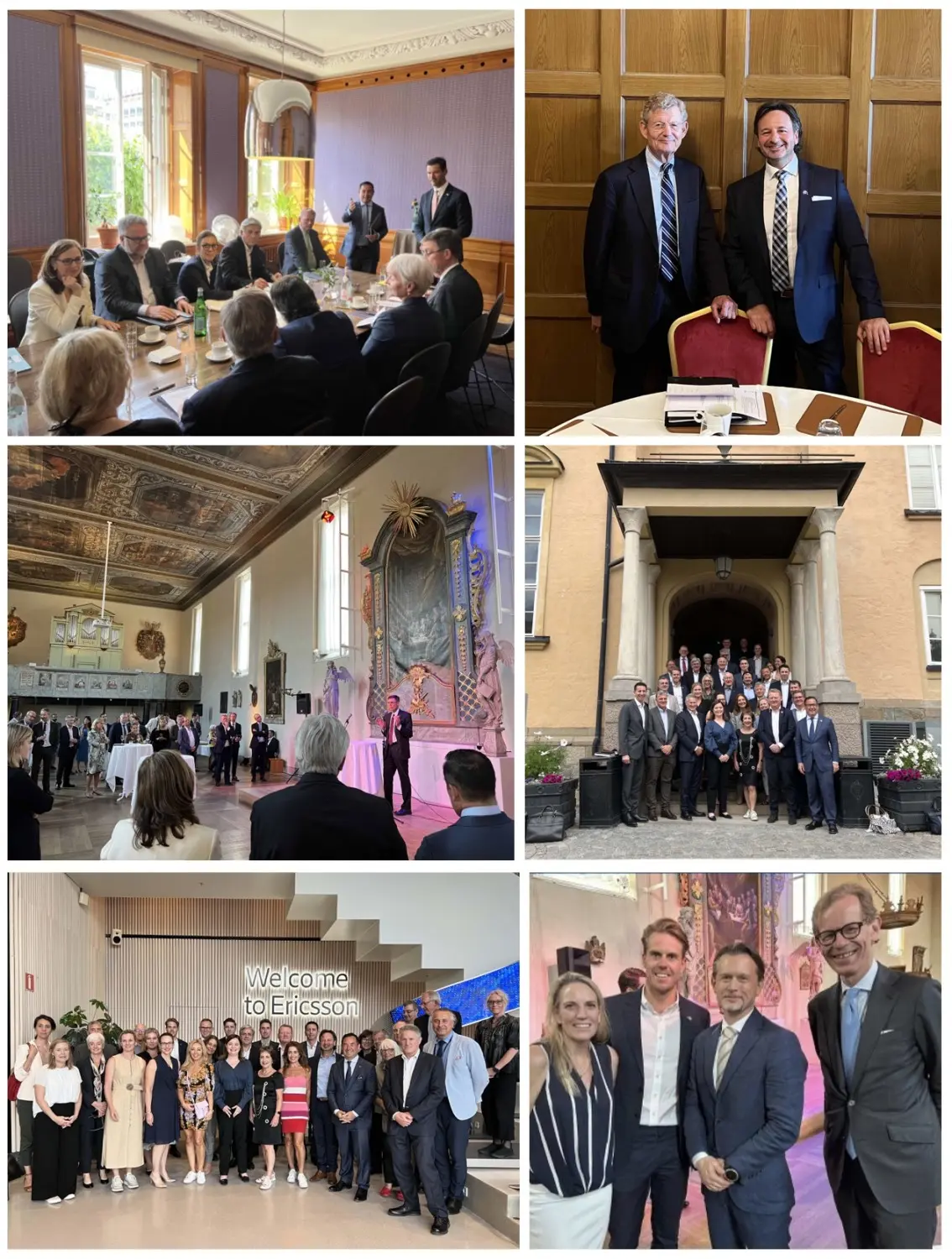EABC’s Business Mission to Europe 2023, 29-30 June in Stockholm, Sweden
 “The best is yet to come in the strong trade relationship between Sweden and Australia.”, a positive message by Johan Forssell, Minister for International Development Cooperation and Foreign Trade at an event in conjunction with the European Australian Business Council’s (EABC) Business Mission to Europe 2023 on 29-30 June in Stockholm.
“The best is yet to come in the strong trade relationship between Sweden and Australia.”, a positive message by Johan Forssell, Minister for International Development Cooperation and Foreign Trade at an event in conjunction with the European Australian Business Council’s (EABC) Business Mission to Europe 2023 on 29-30 June in Stockholm.
The Swedish Australian Chamber of Commerce was delighted by the invitation to take part in the Stockholm program and was represented by SACC Board Directors Camilla Bullock and Carl Wallberg.
The 2 days included meetings, company visits and talks by impressive Swedish industry leaders and business icons such as Jacob Wallenberg, Marcus Wallenberg, Helene Hedblom, CEO at Epiroc and Anders Carp, CEO at Saab, all sharing insight to the commitment to the Australia-Sweden growing business and expanding bilateral relationships.
European Australian Business Council Business Mission to Europe 2023 Stockholm
Summary Day 1 – 29 June
“There is potential for so much more,” echoed from all the prominent speakers during the first day of the Swedish leg of the EABC trade mission.
Ambassador Bernard Philip, Austrade Briefing by Trade and Investment, did a great job describing the building blocks on which the more than 190-year-old trade relationship is built. It’s a relationship between like-minded countries that believe in open trade and long-term relationships built on trust.
Johan Forssell, Minister for Trade and International Development, started off his speech with some well-prepared notes but soon put down the prompt and spoke freely about current situations in Sweden and Europe, including the challenge of the ongoing Russia Crisis and the cost of living crisis. Mr Forssell highlighted how the EU has come together like never before, and other trading partners with shared values are also working closer together to build a strong and prosperous power through trade.
There were three themes that recurred throughout the day:
- The importance of R&D – “It’s not about staying relevant; it’s about being on the forefront”. Australia can learn from Sweden, which ranks at the top of R&D spending as a percentage of GDP at 4.7%, with the majority of the spending coming from the private sector.
- Sustainability and Green Technology – It’s in Sweden’s culture to think about sustainability. However, to achieve our climate and environmental goals, we need to reduce our environmental and climate footprints from the materials we use in our day-to-day lives and in industry. The most inspiring speaker of the day was Sara Mazur, Executive Director of Knut and Alice Wallenberg Foundation, who shared insights on how the foundation supports researchers with long-term (5+5 years) projects to invent for the future.
- Sweden’s unwavering commitment to the Free Trade Agreement (FTA) with Australia was emphasized by several speakers, highlighting that momentum should not be lost when we are so close.
“If you are small, you have to be generous with your technology” was one of the comments from Anders Carp CEO of Saab talking about Saab’s substantial productions in Australia that can also be compared to Cochlear’s productions in Sweden.
Johan Forssell, without giving any more details shared that this month, the biggest contract in history in any sector was signed between Australia and Sweden making his parting words ring true:
“The best is yet to come in the strong trade relationship between Sweden and Australia.”
Summary Day 2 – 30 June
The second day of the conference began with a breakfast discussion on economic, trade, and industrial policies in Sweden. Dr. Anna Breman, First Deputy Governor of the Swedish Riksbank, provided insights into the Monetary Policy in June 2023. Key points highlighted during the discussion included a 0.25 percentage point increase in the policy rate to reach 3.75 percent, the forecast of further rate hikes, and the accelerated pace of government bond sales. The primary focus of Sweden’s monetary policy is to drive the Consumer Price Index with a Fixed Interest Rate (CPIF) back to 2% to reduce inflation and maintain price stability.
Dr. Breman emphasized the commitment of the Monetary Policy to take timely measures to curb inflation, considering the current state of the Swedish economy. The economy is experiencing a slowdown after the post-pandemic rebound, with weak domestic demand but strong export performance. The pace and intensity of future monetary policy tightening will be determined by future development and its impact on the economic outlook and inflation.
The morning session continued with a discussion of Swedish trade, with a particular focus on trade opportunities between Sweden and Australia. Henrik Isakson, Director for Trade Policy at the Confederation of Swedish Enterprise, expressed optimism about the strong trade relationship between the two countries. The discussion then shifted to the new political framework and how Sweden can leverage it in the context of the green transition. Key elements included subordinating trade policy to the Green Deal and broader sustainability agenda, addressing deforestation and forced labor, and promoting a circular economy.
The conference attendees visited KTH Royal Institute of Technology, where discussions revolved around Sweden’s green transition. Northvolt, a prominent company, shared insights on the topic of batteries and electrification. Scania Group also provided their opinion on how they are adapting to battery driven technology. Later, LKAB, the leading mining and minerals group, presented their efforts to form a completely new industry from mine waste, focusing on phosphorus for mineral fertilizers, rare earth elements for electric vehicles and wind turbines, and gypsum for construction.
SSAB, a steel company, discussed their plans to produce fossil-free steel and the potential for collaboration with Australia. Their transformation plan aims to save 4 million tons of CO2 per year by 2030 through the development of a fossil-free iron and steel making value chain using a hydrogen-based direct reduction process.
In the afternoon, Saab highlighted the importance of the strategic alliance with Australia, the value of having a Saab office in Australia, and the benefits of joining NATO for both countries. The day concluded at Ericsson, where insights were provided on how Ericsson has contributed to shaping Australia’s future in 5G technology. The role of mobile networks in enabling the mining industry with autonomous vehicles and enhancing safety was also discussed.
In conclusion, the conference served as a powerful platform to underscore the paramount importance of the trade relationship between Sweden and Australia. By showcasing the immense potential for future growth and cooperation, the event solidified the foundation for long-term collaboration in trade, green transition, and defence. The conference effectively highlighted the indispensable role of these sectors in fostering a mutually beneficial partnership between the two countries, setting the stage for a prosperous and sustainable future.
A big thank you to the European Australian Business Council (EABC), partners and industry representatives involved in the business mission.


